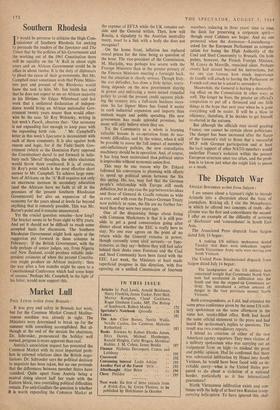Southern Rhodesia
IT would be perverse to criticise the High Com- missioner of Southern Rhodesia for seeking to persuade the readers of the Spectator and The Times that by the policies of his Government and the working out of the 1961 Constitution there will be equality on the 'A' Roll in about eight years and an African Government could be in office in about twelve. It is the duty of diplomats to plead the cause of their governments. But Mr. Campbell must sometimes wish that Prime Minis- ters past and present of the Rhodesias would leave the task to him. Mr. Ian Smith has said that he does not expect to see an African majority in his lifetime. Sir Edgar Whitehead said last week that a unilateral declaration of indepen- dence would bring an African nationalist Gov- ernment twenty years nearer than would other- wise be the case. Sir Roy Welensky, writing in last week's Punch, observes that: 'Our economy is not expanding fast enough to keep pace with the expanding birth rate. . . .' Mr. Campbell's letter in this week's Spectator is inconsistent with each of these comments. It is also against both reason and logic, for if the Field/Smith Gov- ernment (which as the Dominion Party opposed the Constitution) dared to put forward in Salis- bury such 'liberal' thoughts, the white electorate would throw them overboard. It is, of course, Sir Roy's point which is the most effective short answer to Mr. Campbell. To achieve large num- bers of Africans on the `A' Roll requires not only an enormous increase in secondary education (and the Africans have no faith at all in the promises of the present Southern Rhodesian Government) but also an expansion of the economy for the years ahead at levels far beyond anything that is remotely possible. This was Mr. Baron's point and it remains unanswered.
Yet the crucial question remains—how long? The bracket seems to be from eight to fifty years. And yet it should not be difficult to reach some accepted basis for discussion. The Southern Rhodesian Government might look again at the suggestion put forward in these columns in February: `if the British Government, with the help perhaps of senior judges, say, from Nigeria and New Zealand, could produce reliable inde- pendent estimates of when the present Constitu- tion might produce an African majority: then the way after a few months might be open to a Constitutional Conference which had some hope of success.' Perhaps Mr. Campbell, in the light of his letter, would now support this.






























 Previous page
Previous page